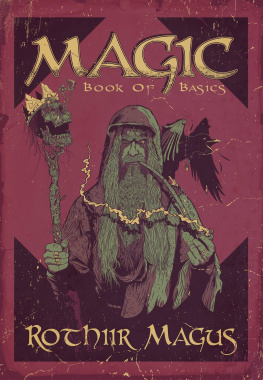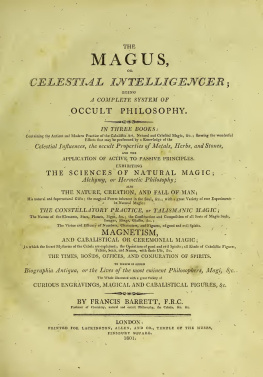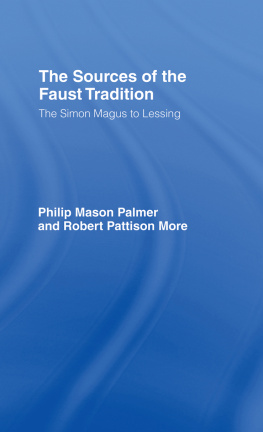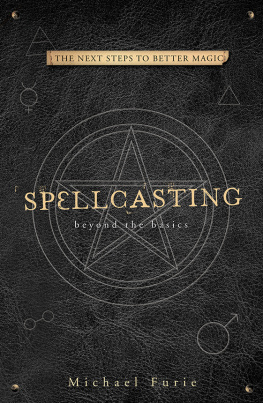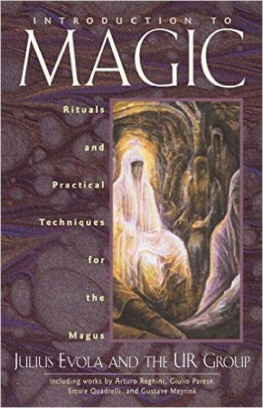Rothiir Magus - Magic - Book of Basics
Here you can read online Rothiir Magus - Magic - Book of Basics full text of the book (entire story) in english for free. Download pdf and epub, get meaning, cover and reviews about this ebook. year: 2016, publisher: eBookIt.com, genre: Religion. Description of the work, (preface) as well as reviews are available. Best literature library LitArk.com created for fans of good reading and offers a wide selection of genres:
Romance novel
Science fiction
Adventure
Detective
Science
History
Home and family
Prose
Art
Politics
Computer
Non-fiction
Religion
Business
Children
Humor
Choose a favorite category and find really read worthwhile books. Enjoy immersion in the world of imagination, feel the emotions of the characters or learn something new for yourself, make an fascinating discovery.
- Book:Magic - Book of Basics
- Author:
- Publisher:eBookIt.com
- Genre:
- Year:2016
- Rating:5 / 5
- Favourites:Add to favourites
- Your mark:
- 100
- 1
- 2
- 3
- 4
- 5
Magic - Book of Basics: summary, description and annotation
We offer to read an annotation, description, summary or preface (depends on what the author of the book "Magic - Book of Basics" wrote himself). If you haven't found the necessary information about the book — write in the comments, we will try to find it.
Magic - Book of Basics — read online for free the complete book (whole text) full work
Below is the text of the book, divided by pages. System saving the place of the last page read, allows you to conveniently read the book "Magic - Book of Basics" online for free, without having to search again every time where you left off. Put a bookmark, and you can go to the page where you finished reading at any time.
Font size:
Interval:
Bookmark:

Magic Book of Basics should be given to a Novice learning the basic level set of magic by their mentor, as is dictated by the Wizarding Rules and Moral Law. However, I am sure some people will buy and use it to test and teach themselves, and this is also acceptable and shows initiative.
It is not for the education of Magicians in the use of Wiccan Magick as I do not believe there is such a thing as Wiccan Magick. What is done in Wicca is not magic, but drama mixed with New Age ideas that people seem to believe are magical. Rather, the following should be used to teach those who have been found to possess the powers of magic in their blood and so have been tested, passed, and are on their way to becoming Magicians by learning about lore and the use of spells.
This book is aimed at those Novices so they can learn the basics of the arts and are able to capably protect themselves and others. It holds basic lore that I believe all Magicians should learn, and will teach you basic spell sets from each of the Schools of Power. It will inform you about who you are as a Magician, teach you exercises to access and control your powers so you find them much easier to use, and it will show you how to test someone else to see if they are a Magician.
Everything you need to know to pass your Novice level of testing and then be able to move on to gain a master to teach you, or alternatively take your learning into your own hands, is in this book. Once this is done this book may seem no longer be useful, but you should know that it is always wise to keep studying your basics so this knowledge is fresh in your mind. After all, if the foundation of all of your future knowledge is a weak one then it makes for a poor structure. The stronger your foundations are, the far greater and stronger your structure shall be. The more you are able to learn, the stronger your power will become. You will also have a deeper connection and sensitivity to your power so if it were to be tampered with, you would be better equipped to do something about it.
You will not be learning how to speak in rhyme or dance under moonlight. You will not be learning what colour candles represent what aspect of being. As I have already stated, this is not magic but drama and false claims to magic. What you will learn is a real form of magic that few are capable of using and even fewer have come to master.
All of the spells in this book are written for the use of a Warlock, Wizard or Druid. If you have been tested and are another type of Magician then these spells will not work for you as they are not compatible with your type of magic.
Use this book well.
Bualnathiuh,
Rothiir Magus
There is a level of morality that most magicians choose to live by and use their magic through, though this is not a rigid structure such as religious morality, as it is subject to the views and opinions of those who interpret it. Not all who practice and use magic follow the Moral Law, and as there is no social standing or law enforcement there is nothing to make a person follow them but his or her own reasoning and moral compass.
The first and most accepted moral law is the Law of Mentors. This law states that should a Magician test someone for magic then they are therefore responsible for them should they be seen to possess the ability. For this reason testing others is not something that is performed by a Novice as they do not have sufficient knowledge or power to handle the tutoring of another Novice. An Apprentice level Magician has the right to test others as they are thus proven to have the knowledge and power to teach the basic skill set, but this is frowned upon as they are still considered too weak and unrefined to handle the task of tutoring. Usually those of the level of Skilled or above perform testing as they are competent enough to take on the responsibility and have the knowledge needed for the task. However, this rule does have its boundaries and limitations: once the Novice has passed the Novice grade of testing and shows competent enough in power and knowledge for the tutor to deem them capable of protecting themselves, then the Law of Mentors comes to an end and the tutor no longer has moral responsibility over that Novice. And so, when this time comes the Mentor can simply walk away and leave the Novice to their own education and training, which unfortunately often happens. Preferably, the Mentor will stay with the Novice and continue overseeing their practice, giving tips and lessons and teaching new spells and lore, though there is no obligation and instead they may suggest ways to learn without direct influence. Should a Novice want their Mentor to continue with training and the Mentor be in agreement, then the Novice is sworn to the Magician that has taken on their training. From this point on they are hence referred to as an Apprentice.
When a Novice is sworn to a Magician and has become their Apprentice they are able to learn new spells and lore to enhance their power and knowledge and further their training. As this is under the guardianship and observation of a Magician, this is far safer than hunting for new spells and lore on ones own. Any predicaments they come across can be examined and overcome with their Mentors help, whilst any dangers they face will also be reduced by the aid of their Mentor. This is obviously not the case when a Novice takes training solely into their own hands. With this new position of Apprentice comes a set of manners and courtesies that the Apprentice should hold themselves to as a sign of respect to their Mentor and as a sign of gratitude for his or her accepting of them. This is not a set of rigid rules and unfortunately I have seen numerous Apprentices fail to follow these standards. What follows are guidelines of courtesies and good manners:
Should a Mentor ask their Apprentice to perform a task for him or her then they should do so. This does not mean the Apprentice should immediately drop everything they are doing as most of us have busy lives. Instead the Apprentice should make time in the near future to perform the task given to them. However if this has nothing to do with their training in any way then the Apprentice has every right to deny the task. But if it does have something to do with their training, even if it is not direct, then the Apprentice should perform the task that is given. The Apprentice should also come to expect a similar level of courtesy from their Mentor, who should not be asking them to perform tasks that have nothing to do with their education. Should a task be given the Mentor should not expect the Apprentice to immediately obey as this is an abuse of standing and shows a lack of patience and respect for their student.
When talking to their Mentor it is a courtesy to refer to them as Master, even if they are not of master grading. However most people feel uncomfortable with this rule and so elect to refer to their Mentor as Senior, a name that is less striking and more humble. This is mostly a courtesy that is used when the Apprentice is in the presence of their Mentor whilst being taught. If the two are together in a social situation rather than a teaching one then this courtesy does not need to be enforced and is rarely used. This courtesy also applies to the Mentor who should refer to their student as Apprentice rather than Novice. But in these changing times most refer to them as students and it has recently become acceptable to refer by name rather than title.
When an Apprentice is not in the presence of their Mentor then they should never insult or talk about them in any ill way, but rather be indifferent or good mannered when conversing with others. Of course, as in any teacher/student relationship, there may be negative tensions between the two and it is fine for the Apprentice to curse about their Mentor when they are alone. And likewise, the same applies to the Mentor, who should not speak ill of their Apprentice behind their back when with others, unless it is about their failings and the Mentor is seeking help from another on how to help their Apprentice overcome them. If this is not followed and the Mentor simply complains about their Apprentice and their failings without thinking of improvements, then this shines ill on the Mentor, rather than the Apprentice, and the negative should always be reinforced with a positive or a possible solution for improvement.
Font size:
Interval:
Bookmark:
Similar books «Magic - Book of Basics»
Look at similar books to Magic - Book of Basics. We have selected literature similar in name and meaning in the hope of providing readers with more options to find new, interesting, not yet read works.
Discussion, reviews of the book Magic - Book of Basics and just readers' own opinions. Leave your comments, write what you think about the work, its meaning or the main characters. Specify what exactly you liked and what you didn't like, and why you think so.

